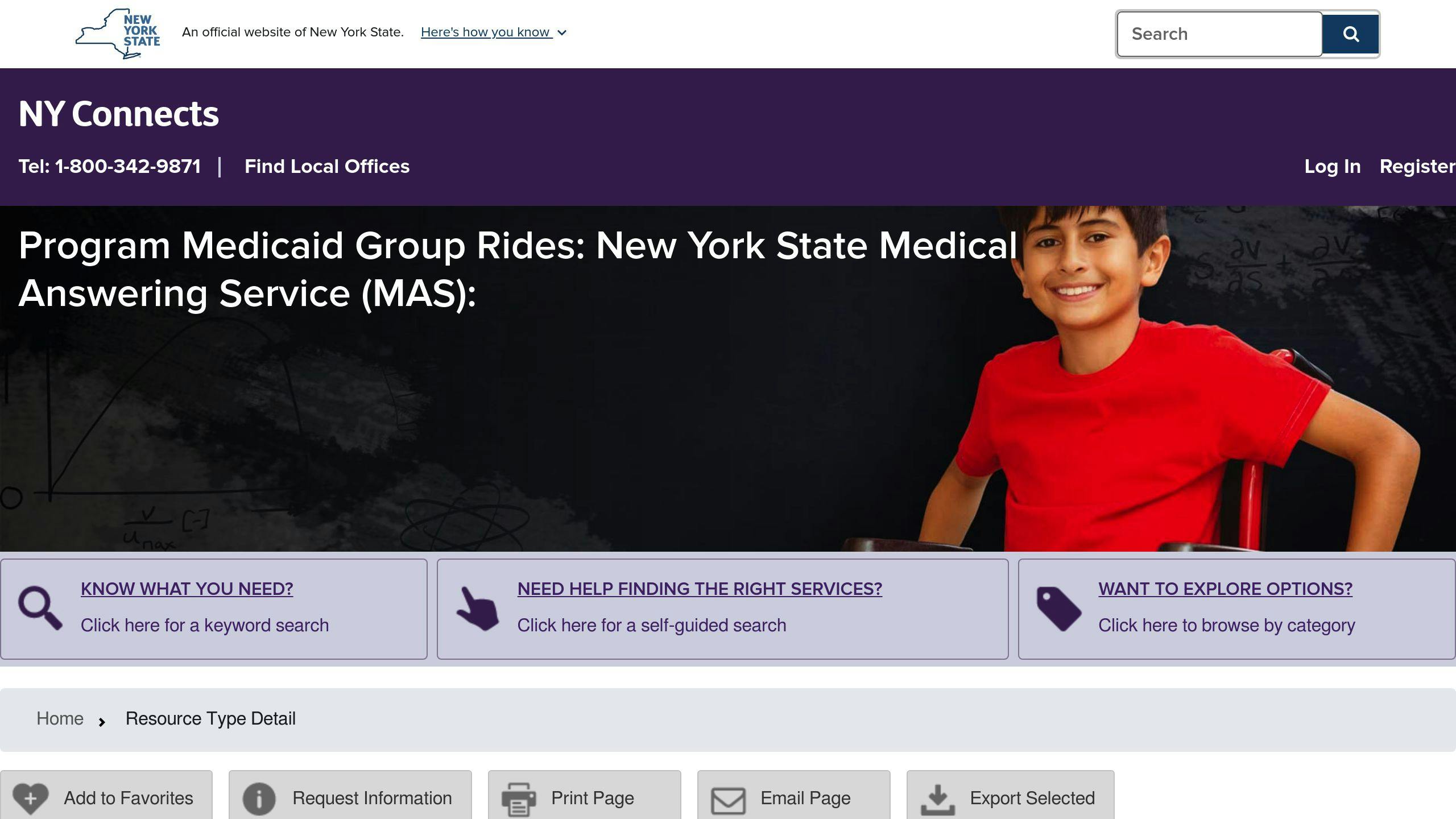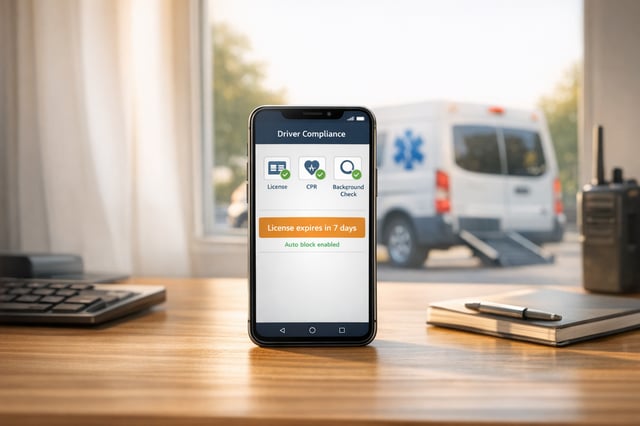

NEMT Entrepreneur provides expert insights, strategies, and resources to help non-emergency medical transportation professionals grow their businesses. Get industry-leading advice to succeed in NEMT.
Featured articles
MAS compliance ensures NEMT providers in New York meet Medicaid's strict requirements, including GPS tracking, driver and vehicle credentialing, and safety standards. Non-compliance risks include payment delays, penalties, and service suspension. Simplifying compliance involves using tools like RouteGenie or Tobi to automate GPS data, credential management, and documentation. Key strategies include:
- Automated GPS Tracking: Ensures real-time trip verification and reduces errors.
- Credential Management: Monitors driver licenses, insurance, and vehicle registrations.
- Streamlined Documentation: Maintains accurate records for audits and payments.
- Workflow Optimization: Centralized scheduling and real-time monitoring to avoid issues.
| Strategy | Benefit | Priority |
|---|---|---|
| GPS Data Automation | Reduces errors and missed payments | Immediate |
| Digital Documentation | Simplifies verification | High |
| Real-Time Monitoring | Flags compliance issues early | Medium |
| Streamlined Workflows | Minimizes mistakes | Ongoing |
Related video from YouTube
Understanding MAS Compliance Challenges

Common Challenges in MAS Compliance
NEMT providers in New York face several operational challenges when working to meet MAS compliance requirements. One critical issue is the need for accurate GPS data to verify trips and secure payment approvals. Errors in GPS tracking can lead to delays or outright denials of payments [1]. Without reliable GPS systems, providers risk running into verification problems during the attestation process.
Another major challenge involves credentialing. This includes keeping track of driver licenses, insurance statuses, and vehicle registrations [5]. The need for constant monitoring places a heavy administrative load on providers.
Scheduling is also a complex task, as NEMT services are used by about 4-5% of New York’s population each year [3]. Providers must balance timely service delivery with MAS’s strict documentation and verification requirements, such as:
- Keeping precise GPS trip records for payment approval
- Regularly updating TPP information to avoid trip refusals
- Ensuring coverage across specific ZIP codes
- Documenting transport activities in real-time
Risks of Non-Compliance
Failing to meet MAS compliance standards can lead to immediate and serious consequences, particularly in terms of finances. Providers may experience:
- Delays in reimbursements
- Denied payments
- Administrative penalties [4]
But the risks go beyond just financial impacts. Operational and reputational issues can arise under MAS’s strict oversight. Even minor compliance lapses can snowball into larger disruptions [5], including:
- Suspension of services
- Termination of contracts
- Harm to professional reputation
- Reduced chances of securing future contracts [2][3]
To avoid these outcomes, providers need strong compliance systems in place. This can involve regular internal audits, training staff on compliance protocols, and using technology to automate key processes [2][3].
Recognizing these challenges is just the beginning. Providers must also take the time to fully understand MAS policies and standards to address issues effectively.
Key MAS Policies and Standards for Providers
GPS Data Submission Requirements
MAS requires accurate GPS tracking to confirm trips and process payments. Providers need systems that meet three main criteria:
| Requirement | Specification | Purpose |
|---|---|---|
| Location Accuracy | Within 50 feet | Trip verification |
| Data Transmission | Continuous upload | Real-time monitoring |
| Storage Duration | Minimum of 7 years | Audit compliance |
These GPS systems must record and verify pickup and drop-off points, timestamps, and the full route in real time [1]. While GPS tracking is critical for trip verification, providers also need to keep their credentials current and follow safety protocols to remain compliant.
Credentialing and Safety Standards
MAS sets strict rules for driver and vehicle credentialing to ensure quality service and passenger safety [2]. Providers need to maintain detailed records in two main categories:
Driver Requirements:
- A valid commercial driver's license (CDL) with necessary endorsements
- A clean driving history, monitored regularly
- Up-to-date medical fitness certifications
- Routine drug testing and background checks
Vehicle Standards:
- Valid state registration and insurance
- Routine safety inspections with maintenance records
- Verified accessibility features
- Emergency response procedures
Providers are required to keep their Transportation Provider Profile (TPP) updated with the latest credentials and safety records [5]. Automated tools for GPS tracking and credential management can help providers meet MAS standards efficiently, reducing errors and delays.
Using automation not only simplifies compliance but also minimizes administrative work, making it easier to meet these obligations.
sbb-itb-cef70f4
Strategies for Simplifying MAS Compliance
Using Software for Automation
Modern tools like RouteGenie and Tobi simplify MAS compliance by automating tasks such as GPS tracking, billing, and reporting. These platforms integrate directly with MAS systems, cutting down on manual work and improving precision.
| Software Feature | RouteGenie | Tobi |
|---|---|---|
| GPS Tracking | Real-time monitoring | Continuous tracking |
| Billing Integration | Automated | Semi-automated |
| Compliance Reporting | Automated daily reports | Custom reporting schedules |
| MAS Integration | Direct connection | API-based integration |
RouteGenie's software has proven to boost operational efficiency. For instance, a New York NEMT provider saw a 30% reduction in administrative workload and a 25% improvement in MAS compliance rates after adopting their platform [4]. The system's ability to automatically submit GPS data ensures providers meet MAS's strict location tracking requirements without manual input. While these tools handle core processes, streamlining workflows is key to maintaining compliance across all operations.
Improving Workflows for Compliance
Efficient workflows are crucial for staying compliant with MAS requirements. Here are some strategies to consider:
- Centralized Scheduling System: Implement a unified platform that automatically checks trip requests against MAS criteria. This minimizes booking mistakes and ensures proper documentation from the beginning.
- Real-Time Monitoring Protocol: Set up automated alerts to detect GPS tracking issues immediately. This allows for quick problem resolution and consistent compliance monitoring.
-
Documentation Automation: Use software to generate and store necessary records. This approach simplifies management of:
- Driver credentials and certifications
- Vehicle maintenance logs
- Trip verification details
- Safety inspection reports
"The implementation of automated compliance systems has transformed our approach to MAS compliance. What used to take hours of manual work is now completed in minutes with greater accuracy", shared a New York NEMT provider who adopted RouteGenie's platform [4].
Effective Documentation and Record Keeping
Importance of Accurate Records
Keeping detailed and accurate records is a must for staying compliant with MAS regulations in New York's NEMT operations. Beyond meeting compliance standards, solid documentation helps cut down on manual tasks, allowing providers to concentrate on delivering top-notch service. Key areas to focus on include GPS breadcrumb data, trip verification details, and billing information. These records play a critical role in aligning with MAS's strict monitoring requirements.
| Documentation Component | Required Details | Update Frequency |
|---|---|---|
| Driver Credentials | License status, certifications | Monthly |
| Vehicle Records | Registration, insurance, maintenance logs | Quarterly |
| Trip Documentation | GPS data, pickup/dropoff times, route details | Daily |
| Billing Records | Service codes, payment details, modifications | Per trip |
Setting up a reliable documentation system is key to meeting these demands and avoiding compliance issues.
Best Practices for Managing Records
Streamlined record management systems make it easier to comply with MAS requirements while reducing the administrative load. Here are some tried-and-true practices providers rely on:
Digital Security Protocols
Protecting sensitive data, especially Medicaid-related information, is non-negotiable in today's NEMT operations. Implement strong security measures to safeguard this information.
Automated Verification Systems
Using automated tools can simplify compliance tasks by:
- Validating GPS and trip details automatically.
- Flagging potential issues and generating compliance reports efficiently.
Standardized Documentation Protocols
1. Daily Operations Records
Keep track of pickup/drop-off times, routes, and any changes for each trip to ensure all details are properly documented.
2. Maintenance Documentation
Update vehicle maintenance logs regularly to meet MAS audit standards and avoid unexpected compliance issues.
3. Compliance Tracking
Centralize tracking of credentials, registrations, and other requirements to stay ahead of deadlines and audits.
These practices not only help with compliance but also improve operational efficiency, leaving more time to focus on service delivery.
Conclusion: Key Points and Future Steps
Summary of Main Strategies
Ensuring MAS compliance requires a mix of smart technology use and efficient processes. With around 4-5% of New York State's population depending on NEMT services each year [3], providers need to adopt strategies that balance automation with clear procedures.
Here are some key strategies to tackle common challenges:
| Strategy | Benefit | Priority |
|---|---|---|
| GPS Data Automation | Cuts down on tracking errors and missed payments | Immediate |
| Digital Documentation | Simplifies attestation and verification | High |
| Real-time Monitoring | Helps avoid compliance issues | Medium |
| Streamlined Workflows | Minimizes mistakes and improves tracking | Ongoing |
These methods directly address issues like GPS inaccuracies and credentialing problems, helping providers maintain smooth operations and secure timely reimbursements. While these strategies meet current needs, keeping up with MAS regulation updates is crucial for long-term success.
Staying Informed on Regulatory Changes
To keep up with MAS requirements, providers can use tools and resources that support real-time compliance tracking. Recent updates have emphasized:
- Improved GPS accuracy for trip verification
- New driver credentialing standards
- Adjusted vehicle safety inspection rules
- Changes to documentation retention policies
Tools like Tobi Cloud have proven effective in reducing compliance mistakes by automating GPS data submissions, insurance tracking, and license checks. This ensures accurate and timely documentation [1]. Additionally, the MAS online portal remains the go-to source for updates and managing transportation arrangements [6].


